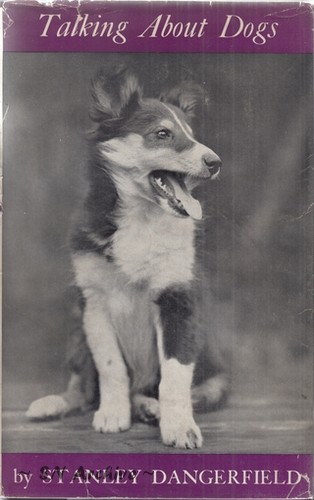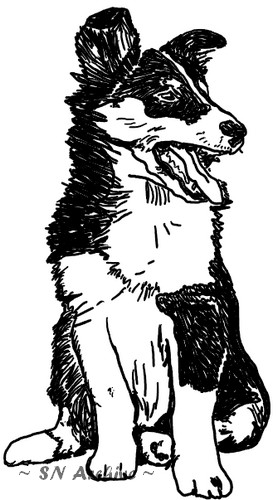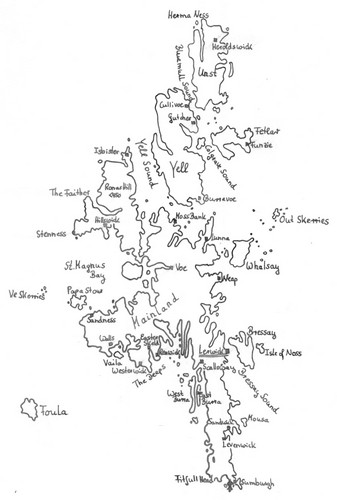 |
Talking About Dogs Stanley Dangerfield, Rockcliff', GB, 1958 |
 I became aware of this book because of the picture of the tricolour puppy "Sheltie" on the cover. There are also some text passages about the Shetland Sheepdog in the book.
I became aware of this book because of the picture of the tricolour puppy "Sheltie" on the cover. There are also some text passages about the Shetland Sheepdog in the book.
In chapter 2, page 9ff - "Changing Fashions" - Stanley Dangerfield analyses developments in the dog scene. In 1956, the Shetland Sheepdog ranked 15th in GB Kennel Club registrations with 1,529 entries. A total of 100,982 dogs were registered that year. By comparison, the Klein Poodle was ranked first in the Top 20 with 16,995 registrations.
On page 18, a graph of 25 breeds illustrates their registration popularity from 1947 to 1956. You can see that the Shetland Sheepdog climbs from 1947 (33rd place) to 16th place in 1954.
Page 18-19: “… this graph shows the sort of fluctuations in popularity which has taken place in the last ten years. It also shows us which breeds have their feet on the slippery slope, which ones are maintaining their position, and which are starting the long climb which may lead them to the top.
The trends shown here may be summarized as follows: …
Upwards: … Shetland Sheepdogs, …”
Page 21: “…, and so I will conclude by telling you why I think the Shetland Sheepdog might top the mid-Elizabethan dogs. Simply because he fits in which all of the known patterns. He is small, makes an excellent town, or non-sporting companion. Everybody can recognize him instantly because of the family resemblance to his large cousin, the Rough Collie. His past performance is encouraging in that with the Smooth-haired Miniature Dachshund and the Miniature Poodle he shares the distinction of having doubled his number of registrations in the past four years. These are the only major breeds to have achieved this. His upward progress is consistent and maintained – forty-seventh in 1936, thirty-third in 1946, and fifteenth in 1956.
Should one mention that the ‘Sheltie’ is an attractive little dog, full of intelligence, very trainable, clean in his habits, faithful and gay? Why, most certainly … but in the long run perhaps his background rather than his many virtues may speed his way to the top.
Should one mention that his Gaelic name when translated means ‘Fairy Dog’, and that he is a dog which does a man-sized job with miniature sheep, the sheep which correspond in size with the miniature cattle and the miniature ponies of the Shetland Isles? Once again, most certainly.
Should one admit that before I finished revising this chapter I had so mesmerized myself that I had bought a Sheltie? Again yes … but only if at the same time I admit that I will seize any excuse, no matter how flimsy, to bring a new puppy into the house!”
Page 30 “Chapter4 – Gundogs: … At the moment the house pets consist of a Poodle, a Wire Fox Terrier, a Griffon, and a Shetland Sheepdog.”
Page 94: “Chapter 12 – the Non-Sporting Group: … Perhaps less well known, although becoming much more fashionable, is the Shetland Sheepdog, a miniature replica in every way of the Collie, hailing from the Shetland Isles, where they were used to herd the miniature sheep – animals, less widely known perhaps than the miniature Shetland cattle, and the Shetland pony.”
Page 128: “Chapter 17 – Television: Another little joy at the Cruft’s broadcast is the fact that exhibitors are there primarily to exhibit and, quite naturally, they do not let television interfere with the main task. On one occasion we were comparing various breeds and Peter West was holding a Shetland Sheepdog while I told viewers all about it. Peter produced the arranged cue of ‘and now Stanley will show you the Collie, so that you may see the difference.’ The cameras were flicked over to me and I stood there … dogless and alone. Collie and exhibitor had shot out of range in response to an urgent message that the all-important Collie class was about to be judged!”
If you discover any errors in the text that may have been caused by the transcription, please let us know for a prompt correction.

